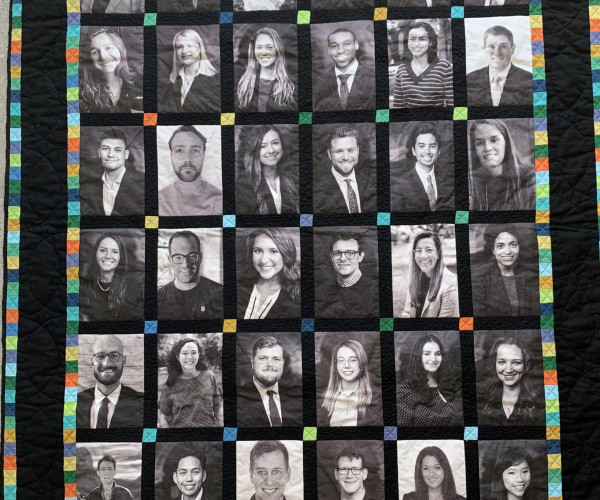Professor Wolff commissions Zoom-inspired quilt to honor 1L Constitutional Law class
When the COVID-19 crisis first struck, it quickly became clear to University of Pennsylvania Carey Law School’s Jefferson B. Fordham Professor of Law Tobias Barrington Wolff that many of his first-year Constitutional Law students were going to feel isolated.
“To the greatest extent possible,” Professor Wolff said, “I wanted to preserve the sense of community that we foster at Penn Law when we are doing our jobs right.”
Perhaps more than any other first-year course, the Constitutional Law curriculum has a personal resonance for many students. Discussions of canonical cases dealing with affirmative action, reproductive rights, and gay rights can feel more emotionally-charged than first-semester conversations about theories of tort liability or what constitutes adequate service of process.
Realizing that Zoom might not be the ideal venue for parsing delicate questions of identity, Professor Wolff has been mindful of the sensitivity required to facilitate such discussions.
He regularly speaks during 1L orientation about his own experience as a gay law student talking about cases involving the rights of gay people, calling on students to remember that every case they read involves the lives of real people, and that plaintiffs and defendants should be spoken of with the respect and empathy this warrants.
“We definitely had some intense conversations,” says Victoria Sanchez L’22, a student in the class. “When you’re talking about an oppressed group of people, there’s always a tension between students being able to speak with authority in terms of their lived experience as members of particular groups, but also not wanting to be put in the position of having to make themselves vulnerable to their entire class when they speak from that perspective. Professor Wolff was keenly aware of that, and he crafted those conversations in a very intentional way.”
Of this spring’s class, Professor Wolff added, “I spoke directly and explicitly to the connection between doctrine and personal experience at various points during the semester.”
During office hours, Professor Wolff talked with students about how the course was going and tried to be responsive to their feedback.
“I think I was only partially successful at striking that balance this semester,” Professor Wolff explained. “We continue trying to become better teachers throughout our careers. Being accountable to our students is a primary responsibility.”
Professor Wolff also adopted the practice of writing to the class every day, sometimes with updates on pertinent information about the Law School, sometimes with announcements about the materials for the class, and sometimes just with commentary on developments in the public health crisis and words of encouragement.
“I viewed it as part of my job,” he said, “to create as much continuity and stability as possible.”
For their part, the students responded “in an extraordinary fashion,” Professor Wolff noted. “Their intellectual engagement inside and outside the classroom was superb, both rigorous and impassioned. It felt like we had come together to commit to the project of this class. Honoring that commitment felt important to me.”
Professor Wolff also found an unconventional way to show his students that they remained a part of something special, despite the extraordinary circumstances. It just so happens that he is friends with Dale Allen-Rouse, aka The Quilting Cowboy, a gay man who uses the traditionally female-identified art of quilting to interrogate prevailing cultural assumptions about gender roles.
Jax Lastinger, a member of the Law School’s Office of Inclusion and Engagement (I&E), did their undergraduate honor thesis on quilting and notes the art “is a distinctive affective object; its meaning lay not only in its ability to provide comfort, but also in its ability to communicate affective feelings, such as love, empathy, and sadness.”
Professor Wolff decided to commission a quilt featuring the faces of his students, a unified work of art composed of many discrete and independent parts, like their dispersed but resilient class. Without telling them why, Professor Wolff asked each of his students for a photo and worked with Allen-Rouse to design the final product, a vivid, tactile tribute to this group who stood together even when the pandemic forced them apart. With each face framed within its own panel of fabric, the quilt resembles Zoom’s “gallery” view of the class, only transformed, rendered comforting, playful, and personal.
Students were deeply moved when Professor Wolff revealed what he had done. Because the last portion of the semester was devoted to discussing LGBTQ+ rights in anticipation of the Title VII cases before the Supreme Court, said Maya Reddy L’22, the quilt reminded her of the powerful AIDS Memorial Quilt.
“As a queer student,” she said, “using a quilt as a symbol to celebrate community and recognize difficult and traumatic times felt especially meaningful,” particularly because the project “was made by a queer artist and was a queer professor’s idea.”
“The quilt was a lovely and truly unexpected surprise,” says Bethany Lee L’22. “It will forever be a favorite memory from 1L year. I so appreciate the thought and effort Professor Wolff put into it. It’s a tangible example of how thoughtful and caring Penn Law professors can be.”





